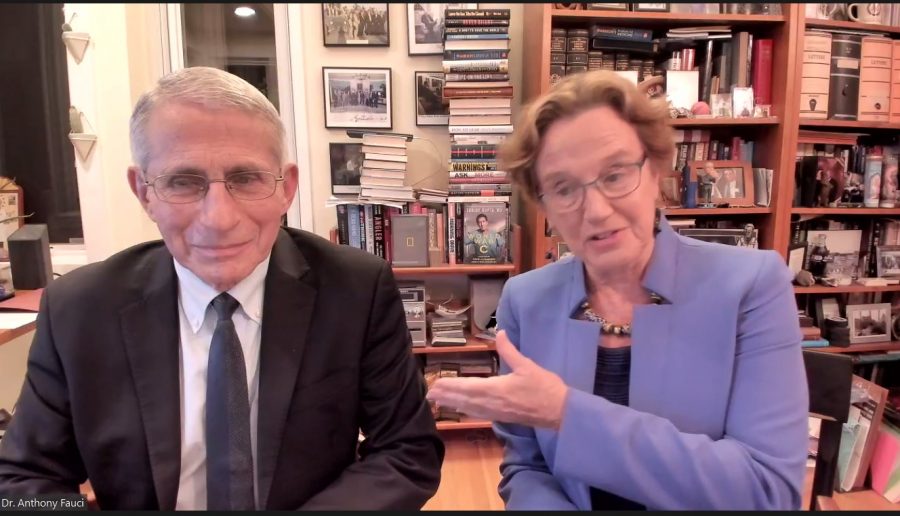Fauci talks ethics, misinformation and COVID-19 at NYU lecture
Anthony Fauci, the U.S. chief medical advisor, spoke at an NYU event about public health and ethics issues that have arisen during the pandemic. He was joined by bioethicist Christine Grady and CNN correspondent Sanjay Gupta.
On Nov. 1 at NYU, U.S. Chief Medical Advisor Anthony Fauci and bioethicist Christine Grady discussed ethical challenges arising from the COVID-19 pandemic. The conversation, which was moderated by CNN correspondent Sanjay Gupta, featured a conversation about vaccine hesitancy. (Image via NYU lecture)
November 4, 2021
U.S. chief medical advisor Anthony Fauci discussed ethical challenges arising from the COVID-19 pandemic at an NYU lecture on Nov. 1. The topics covered included tensions between public health and individual freedoms as well as the erosion of public trust in science.
The event featured a conversation about vaccine hesitancy between Fauci and Christine Grady, chief of bioethics at the National Institutes of Health Clinical Center, and was moderated by CNN Chief Medical Correspondent Sanjay Gupta.
At the beginning of the lecture, Grady identified four causes of public distrusts in vaccines: fear of side effects, failure to understand scientific data, decreased effectiveness of healthcare infrastructure and confusing messages from the federal government. Fauci suggested that the use of false equivalences — such as the “my body, my choice” slogan — is a leading reason why some Americans refuse to get vaccinated.
“Blue and red states on the map reflect who wears masks, who gets vaccinated and who doesn’t,” Fauci said.
In response to the country’s political division, Fauci said a possible way to increase vaccinations is through patience when approaching and encouraging populations that are still unsure of the vaccine’s safety.
Matthew Liao, the director of NYU’s Center for Bioethics and the Nov. 1 lecture organizer, said the United States continues to face difficulties when deciding if vaccines should be allocated to other countries or distributed as booster shots to Americans.
“We, as a country, have some obligations, to try to make sure that other people get greater access to the vaccines,” Liao told WSN. “In the United States, lots of people have gotten vaccine access. At the same time, if you look around the world, there are so many people who still haven’t gotten their first shot yet. It’s in our self-interest to try to get as many people vaccinated as possible.”
NYU Global Public Health will host Micha Mandel, the head of the department of statistics and data science at the Hebrew University of Jerusalem, on Nov. 4 to discuss the effectiveness of booster shots.
Contact Agne Tolockaite at [email protected].
























































































































































